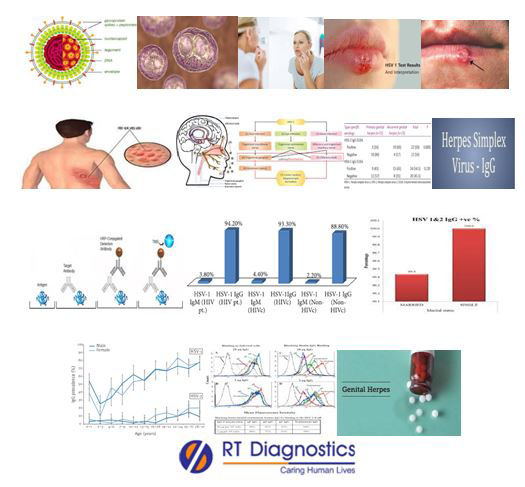HSV-2-IgM:
Why HSV-2 IgMTest ?
CLINICAL INFORMATION
Herpes Simplex Virus (HSV) causes viral infections in human beings and it belongs to Herpesviridae family. The viron structure of this herpes virus consists of a relatively large, double-stranded DNA genome encased within the caspid, wrapped in a lipid bi-layer called as envelope. Two types of Herpes simplex virus predominantly infect the human population (shedding the virus), namely Human alphaherpesvirus-1(HSV-1is mainly caused by flu from an infected person with HSV by sneezing (but also through other modes of transmission) and Human alphaherpesvirus-2 (HSV-2, is a sexually transmitted disease mainly transmitted by sexual contact). Moreover, the transmission of this virus can also occur by vertical transmission (i.e from an infected pregnant mother to the child). Both HSV-1 (produces cold sores) and HSV-2 (causes genital herpes) are common and are highly contagious. The mechanism of action of HSV infection is initially sporadic and on an episode of re-activation (latent infection in neural ganglia i.e trigeminal ganglia) is neurotropic and neuro-invasive mode – via axon of the neuron (the virus persists in the body by hiding from the immune system in the cell bodies of neurons). Symptoms of HSV infection are asymptomatic but also can exhibit certain definite clinical manifestations, which include tingling or itching or burning on the skin, fever, headaches, body aches, swollen lymph nodes, watery painful blisters in the skin or mucus membranes of the mouth, lips, nose and/or genitals, buttocks, anus etc, but also atypically it can present with manifestations particularly in the eye as ocular blisters, in the ear, as meningitis, seizures (due to spread/ dissemination of the virus in the body) etc. The purpose of screening test for herpes is to identify evidence of an HSV infection, such as confirming a diagnosis of HSV infection with oral sore and/or genital sores (to differentiate HSV-1 from HSV-2), suspected pregnant women (HSV is a part of antenatal diagnosis i.e among the TORCH infections – They are a group of congenital infections that may be transmitted from mother to child due to infection), baby/babies born to a mother with HSV (neonatal herpes – symptoms appear during the first month of delivery), asymptomatic cases, susceptible partner, symptoms outbreak, patients with suppressed immune system eg. Conditions like HIV/AIDS, recipients with organ transplantation etc.
Complications of chronic untreated HSV can disseminate and can develop HSV encephalitis (inflammation caused in the brain due to HSV infection). The serological HSV – 2 (IgM) test helps to detect IgM class antibodies which are detectable for 10 to 21 days from the day during initial exposure to the infection. Later class switching of antibody type occurs, thereby the levels of IgM get diminished and IgG levels takeover. Additional tests include an STD test panel which includes partner(s). Other tests include testing on CSF sample specimen with signs and symptoms, HSV- DNA using molecular assays such as real-time PCR, NAAT – Nucleic Acid Amplification Testing (more sensitive), viral culture, Tzanck smear (sample specimen scraped from the patient’s sore) for microscopic examination etc.

General Instructions:
Sample Requirement: Specimen - Fluid Sample from Blister and an infected area.Test Preparation: None.
NOTE - Sample for specimen collections may vary based on the patient’s condition/cases according to the patient’s presenting complaints/signs or symptoms:
SPECIMEN REQUIREMENT (Special or Rare Cases) - As instructed and guided by Physician / Clinician / Pathologist / as per Laboratory’s requirements, according to procedures and protocols.
This Multi-Specialty Clinical Referral Laboratory RT DIAGNOSTICS provides precise and accurate tests with an extensive range of testing services to the medical centres to help in the diagnosis and identification of pathology in the test specimens for infectious diseases and also to evaluate the function of organ systems of the patient. It prevents further complications and helps to stabilize and restore health to near normalcy at the earliest without delay.



